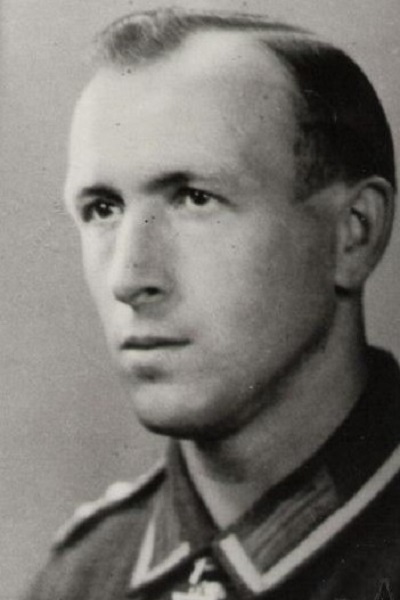Muth, Karl
- Date of birth:
- February 6th, 1916 (Ludwigshafen/Baden, Germany)
- Date of death:
- May 29th, 1990
- Nationality:
- German
Biography
Do you have more information about this person? Inform us!
- Period:
- Second World War (1939-1945)
- Rank:
- Oberfeldwebel (Warrant Officer)
- Unit:
- Zugführer, 7. Kompanie, II. Bataillon, Grenadier-Regiment 399, 170. Infanterie-Division, Heer
- Awarded on:
- September 5th, 1944
"During the hard defensive battles south west of WILKOWISCHKEN during the autumn of 1944, Grenadier Regiment 399 recieved orders to defend a narrow area between two lakes through where the entire division had to pass during its retreat.
The situation: The 7th Kompanie and its temporary Leader Oberfeldwebel Karl Muth, one of the old hands, tried and tested in the line of fire in many battles, was the regimental reserve. Once a Kompanie, now in the size af a platoon.
Over the narrow landbridge is the only escape rout for the division to the west. If the enemy would succeed to break through the front line and seal of the landbridge meant certain destruction of the whole division. Therefore it was crucial that the landbridge remained in control of the Germans.
That is why the seventh had to remain intact. It has the task of leading the counter-attacks in the event of break-ins by the Russians. Oberfeldwebel Muth had strict orders not to get involved in the fighting at the front line and to act only on direct orders of the Regimental commander. But in his thoughts, the company commander appears unsettling, frightening images. A storm surge of people and material rolled against the German main battle line. Somewhere the Russians found a weak spot and breaks in. The defenders are not strong enough to drive them out and the shock
reserve, which now had to intervene, the seventh Company, is not there.
With all communication lost due to enemy action Oberfeldwebel Muth instincts urges him to act with increasing passion. Forward, even without orders!
When the Oberfeldwebel rises above cover and calls out his orders in the firestorm, all doubts and anxiety are gone. The grenadiers follow him. The main battlefield lies wide and empty beneath the red-flashing, thunderous showers of the grenades. But this empty space cannot deceive the company commander.
He hears suspiciously how the raging fire of the machine guns and the dark hammering of the Bolshevik maxims and machine pistols overlap strangely.
Now shots and bursts of fire from houses, foxholes and grain fields are lashing out at them, and when for seconds brown blouse figures appear and disappear again, the bad premonition becomes certainty that the Bolsheviks have broken in!
The company commander needs only a short time to clarify the situation. Two Bolshevik companies with a strength of 150 men sit on a width of 200 meters in the German position and tries to roll it up on both sides. Five times the superiority, but the grenadiers attack them with the force of an explosion that sweeps away all resistance. Advancing far ahead of his company, Oberfeldwebel Muth breaks into the Bolkhevik foxholes.
With ”Hurra” cheers, the grenadiers follow through the middle of the battle. They shoot, throw hand grenades, clear the holes with rifle butts and spades. The Bolsheviks defend themselves for a few minutes with fanaticism. But then the fertility of the German onslaught robs them of their senses.
They give way. Slowly at first, then the withdrawal turns into rampant flight. Only Individual enemies reach their starting positions.
The grenadiers rally around your company commander in proud joy. With a small loss of their own, they smashed and wiped out an enemy force five times their superiority.
The Bolshevik leadership refrained from further attacks on the landbridge. The division withdrew to the west undisturbed and took up its new position. The company leader of the Seventh, however, Oberfeldwebel Karl Muth, wears the Knight's Cross as a sign of high recognition of his deed.”
- Period:
- Second World War (1939-1945)
- Period:
- Second World War (1939-1945)
Sources
- Photo 1: Known to STIWOT
- - FELLGIEBEL, W.P., Elite of theThird Reich, Helion & Company Limited, Solihull, 2003.





